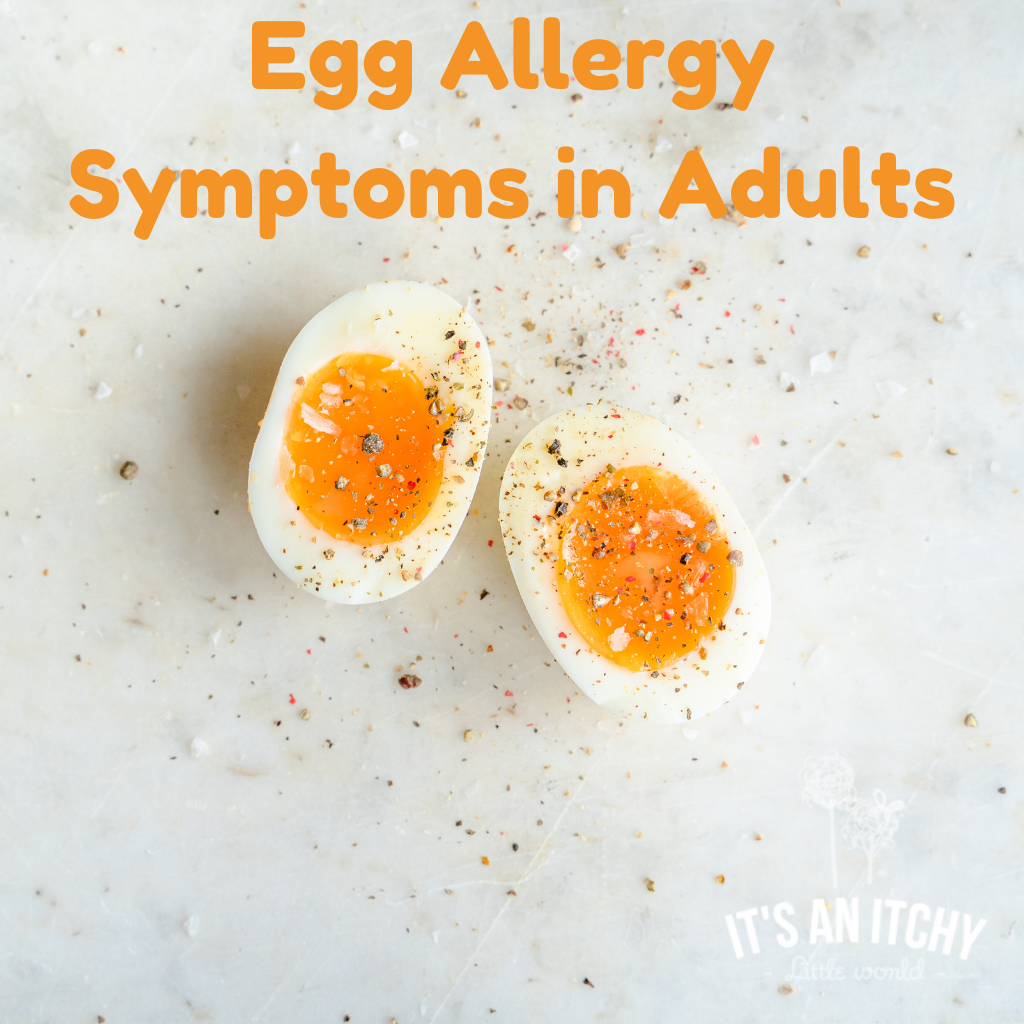Managing Egg Allergy Symptoms in Adults

Chicken eggs are one of the most common food allergens in the world, impacting as many as 2% of all children globally.
While it’s estimated that 70% of those children outgrow their allergy by age 16, many will continue to experience egg allergy symptoms into adulthood, with reactions ranging from mild stomach pain to skin rashes and life-threatening anaphylaxis.
If you’re worried that you or a loved one could be allergic to eggs, throughout this post, we’re going to explore everything you need to know about:
- Why eggs trigger an allergic reaction in some people
- The main signs and symptoms of egg allergy
- How to treat and soothe allergic skin reactions
Keep reading to learn more about how consuming eggs could impact your overall health and how to respond if you experience an allergic reaction.
Egg Allergies: What’s The Cause?
For people with an egg allergy, the body’s immune system is hypersensitive to specific egg proteins found within egg yolks and whites.
In response, the immune system triggers the release of histamine and other defensive chemicals to help ‘protect’ the body against this invasion. These chemicals are responsible for the symptoms of an allergic reaction.
Who Is Most Affected?
Studies have shown that egg allergies have a disproportionate impact:
- Children and infants
- People with a family history of food allergies
- People with other food allergies
- People with eczema or asthma. (This is due to the phenomenon of the atopic march).
What Are The Most Common Symptoms of an Egg Allergy?
If you or your loved one experience any of the following symptoms after eating eggs, you might have an egg allergy:
- Skin inflammation and irritable skin rashes, including hives
- Abdominal pain and stomach cramps
- A runny nose and sneezing (otherwise known as allergic rhinitis)
- Asthma-like symptoms, including coughing or wheezing
- Anaphylaxis is a life-threatening reaction characterized by difficulty breathing, swelling, and a sudden drop in blood pressure
Triggers
It’s essential to recognize that eggs are often a hidden ingredient in many foods, including baked goods, salad dressing, ice cream, and meatballs, so read food labels carefully.
Egg proteins can also be found in improbable places, such as within the yellow fever vaccine or the flu vaccine.
As a breastfeeding parent, you could pass egg proteins onto your infant through breast milk.
Egg Allergy and Egg Intolerance: What’s The Difference?
Unlike egg allergies, an egg intolerance does not result from an immune system response. Instead, egg intolerance tends to originate within the gut due to troubles with digestion, triggering gastrointestinal symptoms such as abdominal pain, vomiting, and diarrhea.
These symptoms typically take a bit longer to manifest than in the case of an allergic reaction, appearing up to 48 hours after you’ve ingested eggs.
When Is It Time To See A Doctor?
If your child exhibits egg allergy symptoms, we urge you to consult a doctor for expert allergy diagnosis and management guidance. Diagnoses usually involve taking a short skin prick and blood tests to help measure your body’s response to a specific food allergen.
In the case of a severe allergic reaction such as an anaphylactic response, go to the hospital emergency room immediately for medical supervision.
Allergic Skin Reactions
An egg allergy’s most common symptoms include skin reactions, such as swelling, a rash, hives, or eczema.
- Eczema (or atopic dermatitis) is a chronic, inflammatory skin condition characterized by rough patches of dry, itchy skin. While the exact cause of eczema is unknown, it is thought to be caused by genetic and environmental factors exacerbated by allergens such as eggs.
- Hives are a common allergic skin reaction creating red raised bumps or welts. These spots can appear anywhere on the body, like tiny little spots, blotches, or significantly connected blemishes. Similar to eczema, they are highly itchy.
Treatment Methods
If eating eggs causes you to break out in an allergic rash, don’t fret! You can take many steps to reduce your skin irritation naturally and effectively.
Use an Anti-Itch Cream
This Organic Manuka Skin Soothing Cream is made from soothing manuka honey, olive oil, and beeswax to soothe inflamed skin. Safe to use from head to toe, this buttery balm is packed full of anti-bacterial properties, helping to protect you against any secondary infections, too.
If your skin rash is particularly itchy, products such as the Organic Aloe Vera for Eczema Skin Soothing Spray can be kept in the fridge for an extra cooling effect when applied. Throw it into your gym bag for relief on the go.
Wear Gentle Clothing
When your skin is itchy, there’s nothing worse than wearing scratchy, tight clothing. To give your skin the best chance of healing, switch to clothing made from hypoallergenic, breathable fabrics such as 100% organic cotton.
For underwear, we’d recommend this 100% Organic Cotton Bra Liner, 100% Organic Cotton Women’s Latex Free Panties, and 100% Organic Cotton Men’s Drawstring Boxers. These products are entirely spandex and latex-free, so you don’t have to worry about worsening your allergic reaction even more.
You’ll be grateful that cotton is also naturally cooling for hot, aggravated skin, helping to prevent excess sweating.
Preventing Allergic Reactions to Egg
To limit a severe allergic reaction, doctors may encourage some patients to avoid eating eggs or reduce their egg consumption. Depending on which variety of egg proteins you’re allergic to, this could involve cutting out egg yolk or egg white, respectively.
Knowing that many children won’t have to avoid eggs for life can be a relief. As their digestive system matures, their body may develop better egg tolerance.
Always consult an allergist and doctor before altering your diet to manage your egg allergy reaction.
Treat and Prevent Your Egg-Allergic Symptoms Today
Whether you’re coping with a severe egg allergy or a mild intolerance, follow these tips to help you better understand how egg products are affecting you and to soothe skin irritation today.
FROM: Allergies, Food Allergies
